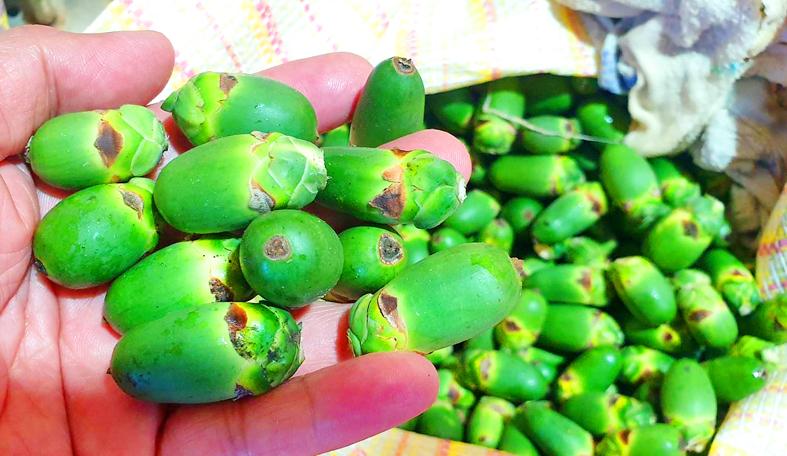Several Taiwanese were detained in Turkey after allegedly taking betel nuts into the country, which regards them as containing illegal drugs, the Ministry of Foreign Affairs said on Friday.
The Chinese Consulate-General in Istanbul on Thursday said in a statement that Chinese and Taiwanese were detained upon arrival in Turkey for carrying betel nuts.
In Taipei, ministry spokeswoman Joanne Ou (歐江安) confirmed that the Taipei Economic and Cultural Mission in Ankara since March has received several reports of Taiwanese being detained by local authorities for carrying betel nuts.

Photo: Yeh Yung-chien, Taipei Times
The mission has asked Turkish authorities to respect the rights of the suspects, and the authorities offered them attorneys and interpreters, Ou said.
While Taiwan’s diplomatic personnel had applied to visit the detained Taiwanese, Turkey’s detention centers are not open to visitors due to COVID-19 restrictions, she said.
The cases have entered judicial proceedings, and the ministry would continue to monitor developments, she said.
The mission would provide assistance to the suspects and their families, she said.
People who travel to Turkey must not take betel nuts, as they would be infringing on local laws, she added.
While Turkey’s criminal code does not stipulate a specific ban on betel nuts, authorities list products as prohibited articles if they contain arecoline hydrobromide.
Turkish law says that people who manufacture, import or export illegal drugs face prison terms of 20 to 30 years, while those found to have distributed drugs or to be involved in drug transactions face jail terms of more than 10 years.
Additional reporting by CNA

A Vietnamese migrant worker on Thursday won the NT$12 million (US$383,590) jackpot on a scratch-off lottery ticket she bought from a lottery shop in Changhua County’s Puyan Township (埔鹽), Taiwan Lottery Co said yesterday. The lottery winner, who is in her 30s and married, said she would continue to work in Taiwan and send her winnings to her family in Vietnam to improve their life. More Taiwanese and migrant workers have flocked to the lottery shop on Sec 2 of Jhangshuei Road (彰水路) to share in the luck. The shop owner, surnamed Chen (陳), said that his shop has been open for just

Global bodies should stop excluding Taiwan for political reasons, President William Lai (賴清德) told Pope Francis in a letter, adding that he agrees war has no winners. The Vatican is one of only 12 countries to retain formal diplomatic ties with Taiwan, and Taipei has watched with concern efforts by Beijing and the Holy See to improve ties. In October, the Vatican and China extended an accord on the appointment of Catholic bishops in China for four years, pointing to a new level of trust between the two parties. Lai, writing to the pope in response to the pontiff’s message on Jan. 1’s

Actress Barbie Hsu (徐熙媛) has “returned home” to Taiwan, and there are no plans to hold a funeral for the TV star who died in Japan from influenza- induced pneumonia, her family said in a statement Wednesday night. The statement was released after local media outlets reported that Barbie Hsu’s ashes were brought back Taiwan on board a private jet, which arrived at Taipei Songshan Airport around 3 p.m. on Wednesday. To the reporters waiting at the airport, the statement issued by the family read “(we) appreciate friends working in the media for waiting in the cold weather.” “She has safely returned home.

TAKE BREAKS: A woman developed cystitis by refusing to get up to use the bathroom while playing mahjong for fear of disturbing her winning streak, a doctor said People should stand up and move around often while traveling or playing mahjong during the Lunar New Year holiday, as prolonged sitting can lead to cystitis or hemorrhoids, doctors said. Yuan’s General Hospital urologist Lee Tsung-hsi (李宗熹) said that he treated a 63-year-old woman surnamed Chao (趙) who had been sitting motionless and holding off going to the bathroom, increasing her risk of bladder infection. Chao would drink beverages and not urinate for several hours while playing mahjong with friends and family, especially when she was on a winning streak, afraid that using the bathroom would ruin her luck, he said. She had